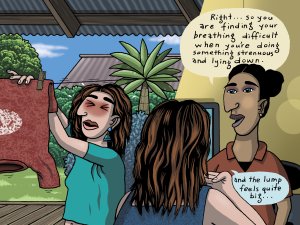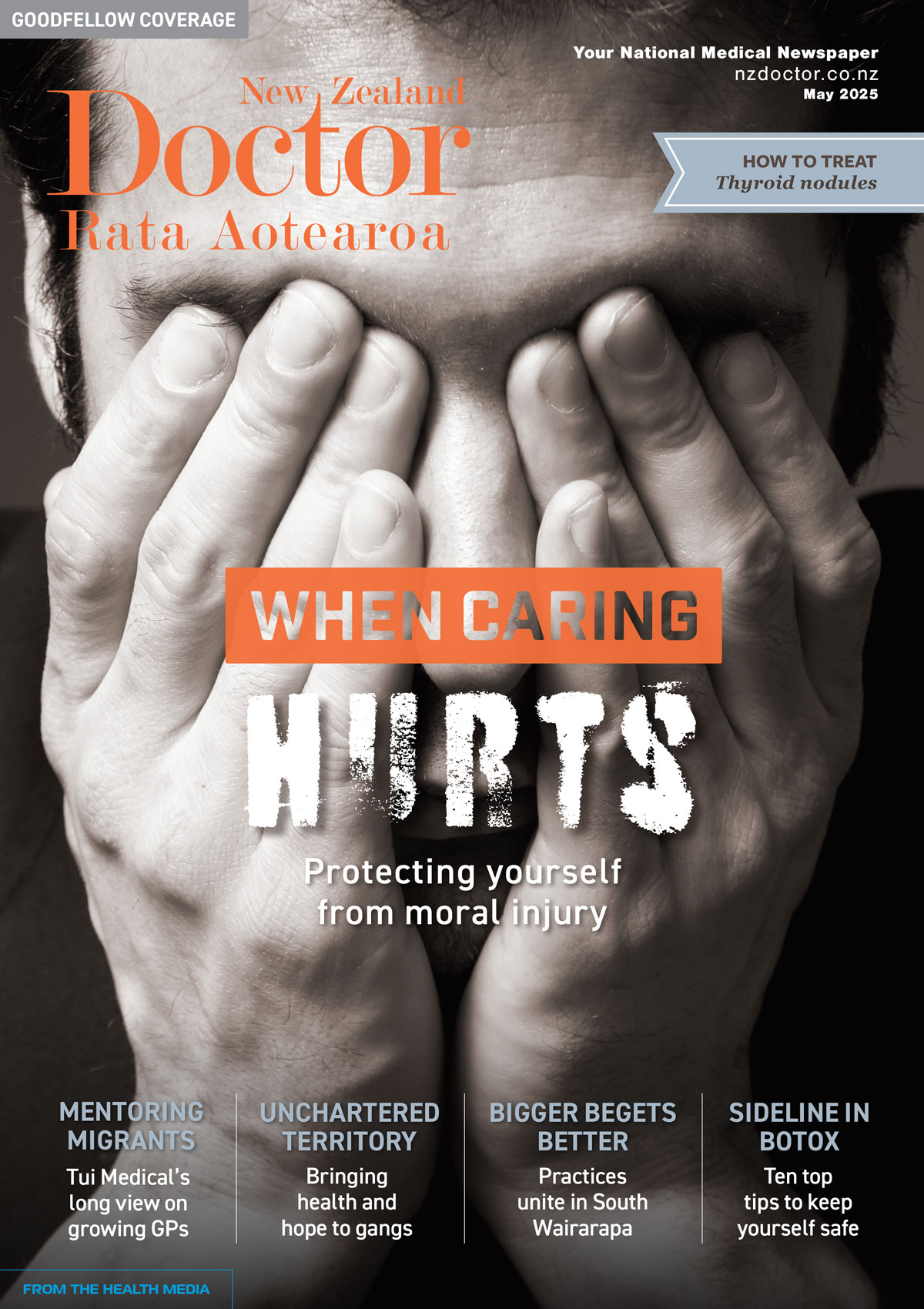Otolaryngologist, head and neck surgeon Francis T. Hall discusses the evaluation of thyroid nodules, which primarily aims to determine the likelihood of malignancy. He then reviews the treatment of thyroid nodules and thyroid cancer, including recent advances in management
Reform and bust
Reform and bust

Health reform is not for the faint hearted nor for those prone to motion sickness. By April 1993, then prime minister Jim Bolger was bringing his number one fix-it man Bill Birch to tackle the reforms unleashed by Simon Upton just two years after they were kicked off [cartoon from New Zealand Doctor archive, 29 April 1993, cartoonist Anthony Ellison].
No matter how innovative, caring, dedicated and heartfelt your efforts, you were not going to make sufficient impact
It truly was a race against time as I tumbled my way through 20 PowerPoint slides at the rate of 20 seconds per slide. I was new to the discipline of PechaKucha – the art of the seven-minute slide presentation – before I tackled one at the recent National Rural Health Conference.
Coming from a large household, I’ve always prided myself on my ability to get my words out fast – it was a necessity if you were to be heard around the dinner table. But the PechaKucha, which in my mind I knew as Betcha Can’tcha, was a challenge.
I had opted to talk on “Primary care – we’ve got you covered”, a whistle-stop tour of our newsroom operandi, through the disruption of COVID, the tabling of the Simpson report, the subsequent delivery of the Little reforms and onwards to land at the doorstep of rural health.
It had occurred to me, as I pondered the presentation, that life has its quirks of fate and, for the health system, it was perhaps former health minister David Clark’s ill-fated mountain-biking excursion during lockdown.
I’m not sure Dr Clark would have had the political standing, inside and outside Cabinet, to make such changes as have been proposed by health minister Andrew Little, specifically the introduction of a strong Māori Health Authority.
Last week’s arrival of He Puapua – the report of the working party on a plan to realise the UN Declaration on the Rights of Indigenous Peoples in Aotearoa/New Zealand – brought with it recommendations on health that are not dissimilar to some of the reform initiatives. This suggests maybe Mr Little’s move to beef up the recommendations made by the Health and Disability System Review Panel should not be such a surprise.
The rural conference gave Mr Little an opportunity to outline his reforms and thinking to the rural crowd. Associate minister Peeni Henare also spoke about the changes proposed to achieve equity in health for Māori.
It’s challenging. Many of our rural workforce have toiled hard and long for their communities, and I can understand there will be some who will take it to heart as a very personal failure. But it would be wrong if people were to feel, lost in a maelstrom of change, that their endeavours have achieved nothing.
The system has failed Māori and it has failed those working in it. Because, for so many clinicians, no matter how innovative, caring, dedicated and heartfelt your efforts, you were not going to make sufficient impact.
There is still plenty of room for celebration or joy in your doings. To improve the outcomes for one patient, one whānau, one community, is an awesome achievement.
Now we’re looking for a move to improve the whole damn lot.
I can’t blithely dismiss people’s concerns about “separate” systems and the splitting of a society. Many rural New Zealand doctors hail from South Africa and memories of apartheid leave them feeling wary.
But this reform is about building one system that meets the needs of all.
Mr Little is asking for a huge investment of trust. This must be met with a huge demand for transparency and accountability from government.
The narrative resonates with so many in the sector, but the hard, fast realities are legion. There has been no proper discussion of funding. The reforms essentially transfer a huge section of the public health sector to a new boss with a hope and a prayer of new culture, aka, a charter. The capacity of iwi organisations is envisaged as being vast, as they will be both designing and delivering health services.
And then there are the high expectations for new localities, to bring together disparate parties from community, primary and secondary care to form the foundation for the system.
It’s not that it won’t go according to plan, it’s just that I’m reminded of the early years of Simon Upton’s reforms in the 1990s, when bits of policy, just quietly, never saw the light of day.
On top of all that, Mr Little is promising the changes will happen quickly. It may not seem like it to those who have been waiting a long, long time, but these changes are to be ushered in at speed. Policy will likely need to be made on the hoof, and that is where transparency and accountability are essential. Trusting it will all go to plan is not an option. Trusting we will be told what we need to know won't cut it either.
Look away, just for a moment, and it will be like a speedy slide show – you’ll lose your place.




![Barbara Fountain, editor of New Zealand Doctor Rata Aotearoa, and Paul Hutchison, GP and senior medical clinician at Tāmaki Health [Image: Simon Maude]](/sites/default/files/styles/thumbnail_cropped_100/public/2025-03/Barbara%20Fountain%2C%20editor%20of%20New%20Zealand%20Doctor%20Rata%20Aotearoa%2C%20and%20Paul%20Hutchison%2C%20GP%20and%20senior%20medical%20clinician%20at%20T%C4%81maki%20Health%20CR%20Simon%20Maude.jpg?itok=-HbQ1EYA)
![Lori Peters, NP and advanced health improvement practitioner at Mahitahi Hauora, and Jasper Nacilla, NP at The Terrace Medical Centre in Wellington [Image: Simon Maude]](/sites/default/files/styles/thumbnail_cropped_100/public/2025-03/2.%20Lori%20Peters%2C%20NP%20and%20advanced%20HIP%20at%20Mahitahi%20Hauora%2C%20and%20Jasper%20Nacilla%2C%20NP%20at%20The%20Terrace%20Medical%20Centre%20in%20Wellington%20CR%20Simon%20Maude.jpg?itok=sUfbsSF1)
![Ministry of Social Development health and disability coordinator Liz Williams, regional health advisors Mary Mojel and Larah Takarangi, and health and disability coordinators Rebecca Staunton and Myint Than Htut [Image: Simon Maude]](/sites/default/files/styles/thumbnail_cropped_100/public/2025-03/3.%20Ministry%20of%20Social%20Development%27s%20Liz%20Williams%2C%20Mary%20Mojel%2C%20Larah%20Takarangi%2C%20Rebecca%20Staunton%20and%20Myint%20Than%20Htut%20CR%20Simon%20Maude.jpg?itok=9ceOujzC)
![Locum GP Helen Fisher, with Te Kuiti Medical Centre NP Bridget Woodney [Image: Simon Maude]](/sites/default/files/styles/thumbnail_cropped_100/public/2025-03/4.%20Locum%20GP%20Helen%20Fisher%2C%20with%20Te%20Kuiti%20Medical%20Centre%20NP%20Bridget%20Woodney%20CR%20Simon%20Maude.jpg?itok=TJeODetm)
![Ruby Faulkner, GPEP2, with David Small, GPEP3 from The Doctors Greenmeadows in Napier [Image: Simon Maude]](/sites/default/files/styles/thumbnail_cropped_100/public/2025-03/5.%20Ruby%20Faulkner%2C%20GPEP2%2C%20with%20David%20Small%2C%20GPEP3%20from%20The%20Doctors%20Greenmeadows%20in%20Napier%20CR%20Simon%20Maude.jpg?itok=B0u4wsIs)
![Rochelle Langton and Libby Thomas, marketing advisors at the Medical Protection Society [Image: Simon Maude]](/sites/default/files/styles/thumbnail_cropped_100/public/2025-03/6.%20Rochelle%20Langton%20and%20Libby%20Thomas%2C%20marketing%20advisors%20at%20the%20Medical%20Protection%20Society%20CR%20Simon%20Maude.jpg?itok=r52_Cf74)
![Specialist GP Lucy Gibberd, medical advisor at MPS, and Zara Bolam, urgent-care specialist at The Nest Health Centre in Inglewood [Image: Simon Maude]](/sites/default/files/styles/thumbnail_cropped_100/public/2025-03/7.%20Specialist%20GP%20Lucy%20Gibberd%2C%20medical%20advisor%20at%20MPS%2C%20and%20Zara%20Bolam%2C%20urgent-care%20specialist%20at%20The%20Nest%20Health%20Centre%20in%20Inglewood%20CR%20Simon%20Maude.jpg?itok=z8eVoBU3)
![Olivia Blackmore and Trudee Sharp, NPs at Gore Health Centre, and Gaylene Hastie, NP at Queenstown Medical Centre [Image: Simon Maude]](/sites/default/files/styles/thumbnail_cropped_100/public/2025-03/8.%20Olivia%20Blackmore%20and%20Trudee%20Sharp%2C%20NPs%20at%20Gore%20Health%20Centre%2C%20and%20Gaylene%20Hastie%2C%20NP%20at%20Queenstown%20Medical%20Centre%20CR%20Simon%20Maude.jpg?itok=Z6u9d0XH)
![Mary Toloa, specialist GP at Porirua and Union Community Health Service in Wellington, Mara Coler, clinical pharmacist at Tū Ora Compass Health, and Bhavna Mistry, specialist GP at Porirua and Union Community Health Service [Image: Simon Maude]](/sites/default/files/styles/thumbnail_cropped_100/public/2025-03/9.%20Mary%20Toloa%2C%20Porirua%20and%20Union%20Community%20Health%20Service%20in%20Wellington%2C%20Mara%20Coler%2C%20T%C5%AB%20Ora%20Compass%20Health%2C%20and%20Bhavna%20Mistry%2C%20PUCHS%20CR%20Simon%20Maude.jpg?itok=kpChr0cc)